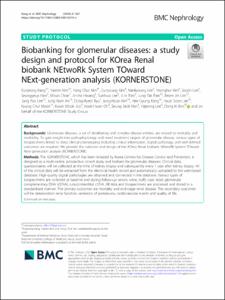KUMEL Repository
1. Journal Papers (연구논문)
1. School of Medicine (의과대학)
Dept. of Internal Medicine (내과학)
Biobanking for glomerular diseases: a study design and protocol for KOrea Renal biobank NEtwoRk System TOward NExt-generation analysis (KORNERSTONE)
- Keimyung Author(s)
- Kim, Yae Rim; Han, Seung Yeup; Choe, Mi Sun
- Journal Title
- BMC nephrology
- Issued Date
- 2020
- Volume
- 21
- Issue
- 1
- Keyword
- Nephrology; Pathology; Glomerulonephritis
- Abstract
- Backgrounds:
Glomerular diseases, a set of debilitating and complex disease entities, are related to mortality and morbidity. To gain insight into pathophysiology and novel treatment targets of glomerular disease, various types of biospecimens linked to deep clinical phenotyping including clinical information, digital pathology, and well-defined outcomes are required. We provide the rationale and design of the KOrea Renal biobank NEtwoRk System TOward Next-generation analysis (KORNERSTONE).
Methods:
The KORNERSTONE, which has been initiated by Korea Centres for Disease Control and Prevention, is designed as a multi-centre, prospective cohort study and biobank for glomerular diseases. Clinical data, questionnaires will be collected at the time of kidney biopsy and subsequently every 1 year after kidney biopsy. All of the clinical data will be extracted from the electrical health record and automatically uploaded to the web-based database. High-quality digital pathologies are obtained and connected in the database. Various types of biospecimens are collected at baseline and during follow-up: serum, urine, buffy coat, stool, glomerular complementary DNA (cDNA), tubulointerstitial cDNA. All data and biospecimens are processed and stored in a standardised manner. The primary outcomes are mortality and end-stage renal disease. The secondary outcomes will be deterioration renal function, remission of proteinuria, cardiovascular events and quality of life.
Discussion:
Ethical approval has been obtained from the institutional review board of each participating centre and ethics oversight committee. The KORNERSTONE is designed to deliver pioneer insights into glomerular diseases. The study design allows comprehensive, integrated and high-quality data collection on baseline laboratory findings, clinical outcomes including administrative data and digital pathologic images. This may provide various biospecimens and information to many researchers, establish the rationale for future more individualised treatment strategies for glomerular diseases.
- Publisher
- School of Medicine (의과대학)
- Citation
- Eunjeong Kang et al. (2020). Biobanking for glomerular diseases: a study design and protocol for KOrea Renal biobank NEtwoRk System TOward NExt-generation analysis (KORNERSTONE). BMC nephrology, 21(1), 367. doi: 10.1186/s12882-020-02016-z
- Type
- Article
- ISSN
- 1471-2369
- Source
- https://bmcnephrol.biomedcentral.com/articles/10.1186/s12882-020-02016-z
- Appears in Collections:
- 1. School of Medicine (의과대학) > Dept. of Internal Medicine (내과학)
1. School of Medicine (의과대학) > Dept. of Pathology (병리학)
- 파일 목록
-
-
Download
 oak-2020-0199.pdf
기타 데이터 / 1.9 MB / Adobe PDF
oak-2020-0199.pdf
기타 데이터 / 1.9 MB / Adobe PDF
-
Items in Repository are protected by copyright, with all rights reserved, unless otherwise indicated.